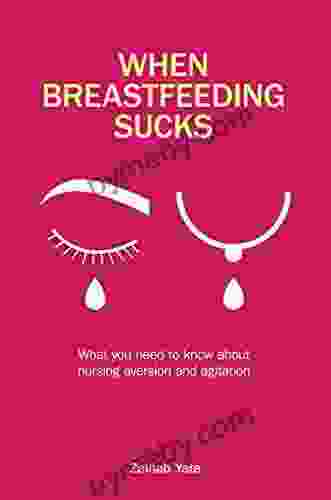Understanding Nursing Aversion and Agitation: A Comprehensive Guide

As we age, it is not uncommon to experience changes in our physical and cognitive abilities. These changes can sometimes lead to challenges in providing or receiving care, particularly when it involves personal hygiene and medical interventions. Nursing aversion and agitation are two common issues that can arise in these situations, often posing significant difficulties for both the individual and their caregivers.
4.9 out of 5
| Language | : | English |
| File size | : | 3231 KB |
| Text-to-Speech | : | Enabled |
| Screen Reader | : | Supported |
| Enhanced typesetting | : | Enabled |
| Word Wise | : | Enabled |
| Print length | : | 256 pages |
| Lending | : | Enabled |
This article aims to provide a comprehensive overview of nursing aversion and agitation, exploring their causes, symptoms, and effective management strategies. By understanding these concepts, healthcare professionals and loved ones can better support individuals experiencing these challenges, promoting their well-being and enhancing the quality of care.
What is Nursing Aversion?
Nursing aversion refers to a negative response or resistance to receiving care from nurses or other healthcare professionals. This behavior can manifest in various ways, including:
- Refusal to cooperate with care tasks
- Verbal or physical aggression towards caregivers
- Withdrawal or avoidance of social interactions
- Anxiety, fear, or panic when faced with caregiving situations
Nursing aversion is often associated with conditions that affect cognitive function, such as dementia or Alzheimer's disease. In these cases, individuals may experience difficulty understanding the purpose of care or feeling overwhelmed by the presence of unfamiliar individuals.
What is Agitation?
Agitation is a state of restlessness, irritability, and increased activity. It can be caused by a variety of factors, including medical conditions, medications, and psychological distress. In nursing situations, agitation may manifest as:
- Pacing, wandering, or fidgeting
- Verbal outbursts or cries
- Difficulty concentrating or sleeping
- Increased irritability or aggression
Agitation can be a challenging behavior to manage, as it can lead to falls, injuries, and conflict between the individual and their caregivers.
Causes of Nursing Aversion and Agitation
The causes of nursing aversion and agitation are complex and often multifactorial. Some common factors that contribute to these behaviors include:
- Cognitive impairment: Conditions such as dementia and Alzheimer's disease can affect an individual's ability to understand the purpose of care or recognize familiar faces, leading to fear or resistance.
- Pain or discomfort: Underlying medical conditions, such as arthritis or infections, can cause pain or discomfort that can be made worse by caregiving activities.
- Sensory sensitivities: Individuals with dementia may experience heightened sensitivity to touch, noise, or light, which can make caregiving uncomfortable or overwhelming.
- Past negative experiences: Previous negative experiences with medical care or caregivers can create a sense of mistrust or anxiety, leading to nursing aversion or agitation.
- Environmental factors: The environment in which care is provided can also influence behaviors. Factors such as noise, lack of privacy, or unfamiliar surroundings can contribute to agitation or anxiety.
Management Strategies for Nursing Aversion and Agitation
Managing nursing aversion and agitation requires a compassionate and individualized approach that addresses the underlying causes and provides support to both the individual and their caregivers. Effective strategies include:
- Identify triggers: Observe the individual to identify situations or triggers that may elicit nursing aversion or agitation. This information can help caregivers develop strategies to avoid or minimize these triggers.
- Provide a calm and supportive environment: Create a safe and calming environment that is free from noise and distractions. Use soothing colors, soft lighting, and familiar objects to promote relaxation.
- Establish a routine: Maintaining a predictable routine can provide a sense of comfort and reduce anxiety for individuals with dementia. Stick to scheduled times for caregiving activities and avoid making frequent changes.
- Use non-verbal communication: Individuals with cognitive impairment may have difficulty understanding spoken language. Use gestures, eye contact, and touch to convey messages and build trust.
- Reassure and validate the individual's feelings: Let the individual know that you understand their feelings and that they are not alone. Be patient and avoid using harsh language or confrontational approaches.
- Engage in activities that bring joy: Find activities that the individual enjoys and incorporate them into caregiving routines. This could include listening to music, reading, or playing games.
- Consider sensory therapies: Therapies such as aromatherapy, massage, or music therapy can help calm agitation and reduce stress.
- Seek professional help: If nursing aversion or agitation becomes severe or难以管理, consider seeking professional help from a healthcare provider or mental health professional. They can assess the underlying causes and recommend appropriate medications or therapies.
Nursing aversion and agitation are common challenges in elderly care, but with the right strategies, they can be managed effectively. By understanding the causes and symptoms of these behaviors and implementing individualized management plans, healthcare professionals and loved ones can create a supportive and compassionate care environment that promotes the well-being of individuals experiencing these challenges. Remember, patience, empathy, and a collaborative approach are key to providing quality care and enhancing the quality of life for all involved.
4.9 out of 5
| Language | : | English |
| File size | : | 3231 KB |
| Text-to-Speech | : | Enabled |
| Screen Reader | : | Supported |
| Enhanced typesetting | : | Enabled |
| Word Wise | : | Enabled |
| Print length | : | 256 pages |
| Lending | : | Enabled |
Do you want to contribute by writing guest posts on this blog?
Please contact us and send us a resume of previous articles that you have written.
 Book
Book Novel
Novel Page
Page Chapter
Chapter Text
Text Story
Story Genre
Genre Reader
Reader Library
Library Paperback
Paperback E-book
E-book Magazine
Magazine Newspaper
Newspaper Paragraph
Paragraph Sentence
Sentence Bookmark
Bookmark Shelf
Shelf Glossary
Glossary Bibliography
Bibliography Foreword
Foreword Preface
Preface Synopsis
Synopsis Annotation
Annotation Footnote
Footnote Manuscript
Manuscript Scroll
Scroll Codex
Codex Tome
Tome Bestseller
Bestseller Classics
Classics Library card
Library card Narrative
Narrative Biography
Biography Autobiography
Autobiography Memoir
Memoir Reference
Reference Encyclopedia
Encyclopedia Shirley Ulbrich
Shirley Ulbrich Steve Magness
Steve Magness Thomas Teselli
Thomas Teselli Shelly Mazzanoble
Shelly Mazzanoble Ayano Yamane
Ayano Yamane Sherrilyn Kenyon
Sherrilyn Kenyon Stella Benson
Stella Benson Judy Goodspeed
Judy Goodspeed Rik Riqueza
Rik Riqueza Xiaolu Guo
Xiaolu Guo Sara Wolf
Sara Wolf Victor Cruz
Victor Cruz Timothy Dukes
Timothy Dukes Tori Bortman
Tori Bortman Tim Lawrence
Tim Lawrence Mary Ann Tirone Smith
Mary Ann Tirone Smith Howie Carr
Howie Carr Vanessa Collingridge
Vanessa Collingridge Justin Seitz
Justin Seitz Shay Tiziano
Shay Tiziano
Light bulbAdvertise smarter! Our strategic ad space ensures maximum exposure. Reserve your spot today!

 W.H. AudenNarrative of the Life of Frederick Douglass: An Enduring Tale of Resilience,...
W.H. AudenNarrative of the Life of Frederick Douglass: An Enduring Tale of Resilience,... Patrick HayesFollow ·3.7k
Patrick HayesFollow ·3.7k Robert HeinleinFollow ·11.9k
Robert HeinleinFollow ·11.9k Don ColemanFollow ·10.6k
Don ColemanFollow ·10.6k Jordan BlairFollow ·12.2k
Jordan BlairFollow ·12.2k Jim CoxFollow ·10.5k
Jim CoxFollow ·10.5k Eric HayesFollow ·7k
Eric HayesFollow ·7k David Foster WallaceFollow ·2.6k
David Foster WallaceFollow ·2.6k Marvin HayesFollow ·8.8k
Marvin HayesFollow ·8.8k

 Donald Ward
Donald WardUnveiling the Enthralling World of "Belong to the Baddest...
In the vibrant and...

 José Martí
José MartíCrowned Crows of Thorne Point: A Literary Odyssey into...
In the realm of literary masterpieces,...
4.9 out of 5
| Language | : | English |
| File size | : | 3231 KB |
| Text-to-Speech | : | Enabled |
| Screen Reader | : | Supported |
| Enhanced typesetting | : | Enabled |
| Word Wise | : | Enabled |
| Print length | : | 256 pages |
| Lending | : | Enabled |


















